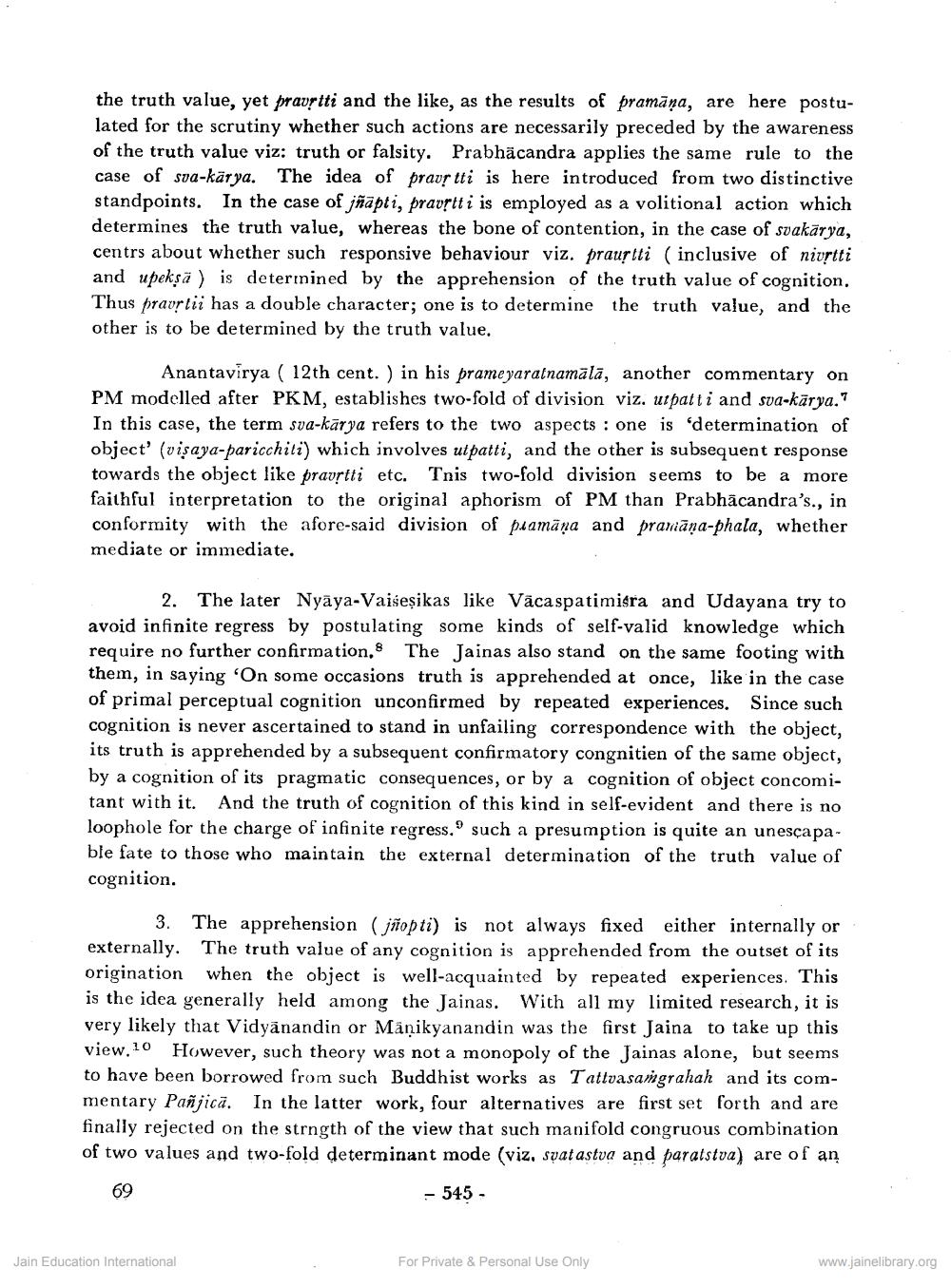Book Title: Some Remarks on The Pramanyavada of Jainism Author(s): Atsushi Uno Publisher: Z_Kailashchandra_Shastri_Abhinandan_Granth_012048.pdf View full book textPage 4
________________ the truth value, yet pravștti and the like, as the results of pramāņa, are here postulated for the scrutiny whether such actions are necessarily preceded by the awareness of the truth value viz: truth or falsity. Prabhācandra applies the same rule to the case of sva-karya. The idea of pravștti is here introduced from two distinctive standpoints. In the case of jñāpti, pravítt i is employed as a volitional action which determines the truth value, whereas the bone of contention, in the case of svakārya, centrs about whether such responsive behaviour viz. praustti (inclusive of nivetti and upeksä) is determined by the apprehension of the truth value of cognition. Thus pravrtii has a double character; one is to determine the truth value, and the other is to be determined by the truth value. Anantavirya ( 12th cent. ) in his prame yaratnamālā, another commentary on PM modelled after PKM, establishes two-fold of division viz, urpatti and sva-kārya." In this case, the term sva-kārya refers to the two aspects : one is determination of object' (visaya-paricchili) which involves utpatti, and the other is subsequent response towards the object like pravștti etc. Tnis two-fold division seems to be a more faithful interpretation to the original aphorism of PM than Prabhācandra's., in conformity with the afore-said division of peamāna and prawiāņa-phala, whether mediate or immediate. 2. The later Nyāya-Vaiseșikas like Vāca spatimigra and Udayana try to avoid infinite regress by postulating some kinds of self-valid knowledge which require no further confirmation. The Jainas also stand on the same footing with them, in saying 'On some occasions truth is apprehended at once, like in the case of primal perceptual cognition unconfirmed by repeated experiences. Since such cognition is never ascertained to stand in unfailing correspondence with the object, its truth is apprehended by a subsequent confirmatory congnitien of the same object, by a cognition of its pragmatic consequences, or by a cognition of object concomitant with it. And the truth of cognition of this kind in self-evident and there is no loophole for the charge of infinite regress.' such a presumption is quite an unescapable fate to those who maintain the external determination of the truth value of cognition. 3. The apprehension (jñopti) is not always fixed either internally or externally. The truth value of any cognition is apprehended from the outset of its origination when the object is well-acquainted by repeated experiences. This is the idea generally held among the Jainas. With all my limited research, it is very likely that Vidyānandin or Māņikyanandin was the first Jaina to take up this view.10 However, such theory was not a monopoly of the Jainas alone, but seems to have been borrowed from such Buddhist works as Tattvasamgrahah and its commentary Pañjică. In the latter work, four alternatives are first set forth and are finally rejected on the strngth of the view that such manifold congruous combination of two values and two-fold determinant mode (viz, svat astva and paratstva) are of an 69 - 545 - Jain Education International For Private & Personal Use Only www.jainelibrary.orgPage Navigation
1 2 3 4 5 6 7
